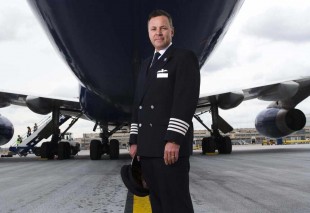

BA pilot shares top 10 tips for nervous flyers

A new book, based on British Airways’ course for nervous flyers, is expected to help thousands of customers in the Middle East conquer their fears.
The book, co-written by British Airways pilot Captain Steve Allright, takes information from the airline’s one-day Flying with Confidence course, which has helped more than 45,000 people over the past 25 years.
“As pilots, we want every customer to have a safe and enjoyable flight. We understand that flying can be a daunting prospect for some and hope that British Airways’ Flying with Confidence course and book can help to alleviate those concerns,” said the pilot.
The book launches on March 7 and addresses a number of areas of concern including how an aircraft operates, turbulence and gives advice from clinical psychologists including relaxation techniques.
Here are the top 10 tips from Captain Allright.
· Remember that turbulence is uncomfortable but not dangerous. It is a perfectly normal part of flying caused by nature.
· Learn to control your breathing. When you feel anxious, hold your breath, then take a long deep breath in, followed by a long deep breath out. Continue long deep breathing.
· Combine the deep breath in with a muscle contraction. Clenching your buttocks is most effective, as it overrides other nervous signals going up and down your spinal chord.
· Aircraft like to be in the air. They are designed to be in the air.
· Pilots and cabin crew like to be in the air also, it is a very normal, safe environment for them to be in.
· Understand lift. The wings enable aircraft to fly, not the engines. A commercial aircraft flying at 30,000ft can glide for 100 miles even if all the engines fail.
· Split a long flight up into half-hour sections. Go with a plan of things to do, perhaps things you never get round to. Write a letter, watch a film, read a book, eat a meal.
· Pilots undergo a rigorous selection procedure and are one of the most highly-trained and tested professions on earth. They are subjected to simulator tests every six months.
· Commercial aircraft are incredibly well maintained, and are checked before every flight by pilots and engineers. Routine maintenance is conducted at regular, specified intervals by licensed engineers.
· Air traffic controllers are trained and licensed professionals operating under a very strict set of rules. All pilots have to abide by the rules of the air.
· Visualise yourself stepping off the aircraft into the arms of loved ones, or into a lovely warm climate, or into a successful business meeting.